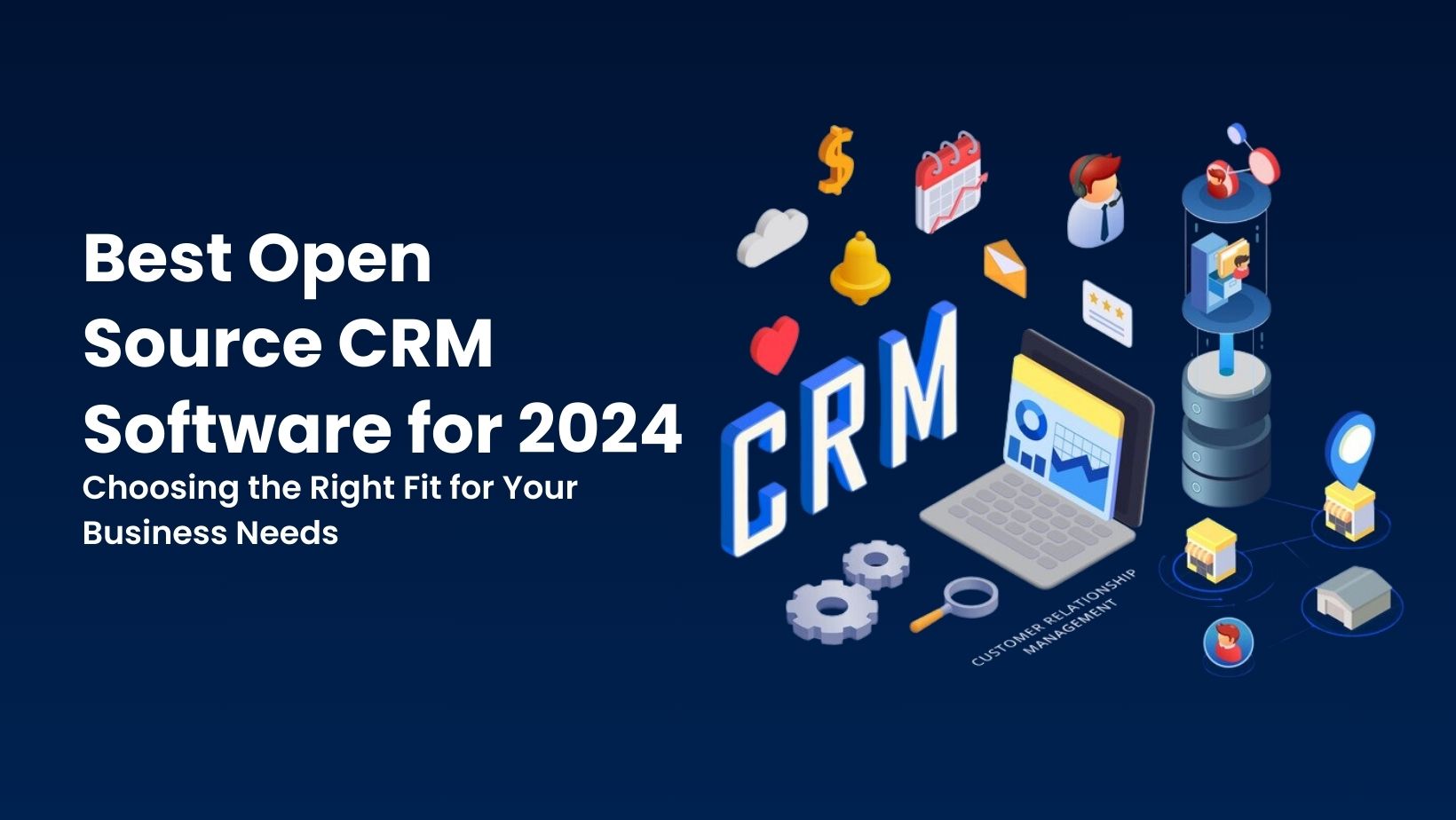Customer Relationship Management (CRM) software is a vital tool for businesses of all sizes. It helps manage interactions with customers and potential customers, streamline processes, and improve overall customer satisfaction. While many powerful CRM solutions exist, open-source options offer a compelling alternative for companies seeking cost-effectiveness, customization flexibility, and access to the underlying code.
This article explores the top contenders in the open-source CRM landscape for 2024, providing a technical perspective for developers and IT professionals. We’ll delve into the features, strengths, and potential considerations for each solution.
Why Consider Open Source CRM Software?
Open-source CRM software offers several advantages for businesses:
- Cost-effectiveness: Open-source solutions are typically free to download and use, eliminating hefty licensing fees associated with proprietary CRM software.
- Customization: The open-source nature allows developers to modify the source code and tailor the CRM system to address specific business needs. This level of customization is often limited to proprietary software.
- Security and Transparency: Open-source code is publicly available, enabling developers to inspect the codebase for security vulnerabilities and ensure data privacy is maintained.
- Vibrant Community: Open-source CRM solutions often benefit from a large and active developer community that contributes to ongoing development, bug fixes, and feature enhancements.
While open-source CRM software provides significant benefits, some potential drawbacks should be considered:
- Implementation and Maintenance: Setting up and maintaining an open-source CRM system might require in-house technical expertise or collaboration with an open-source CRM Solutions Company. This can involve additional costs compared to managed, cloud-based CRM solutions.
- Limited Support: While community support exists, dedicated technical support might not be readily available compared to proprietary solutions with established vendor support channels.
- Scalability: Scaling an open-source CRM system for a rapidly growing business might require additional development resources.
Ultimately, the decision to adopt an open-source CRM solution depends on a company’s specific needs, technical capabilities, and budget constraints.
Top Open Source CRM Software for 2024
Here’s a detailed analysis of some of the leading open-source CRM software solutions for 2024:
1. SuiteCRM:
- Description: SuiteCRM is a powerful and feature-rich open-source CRM solution based on the popular SugarCRM platform. It offers a comprehensive suite of tools for managing leads, contacts, opportunities, customer service, and marketing automation.
- Strengths:
- Highly customizable with a modular architecture.
- Supports a wide range of integrations with third-party applications.
- Offers a user-friendly interface with mobile app accessibility.
- Technical Considerations:
- Requires some technical expertise for initial setup and ongoing maintenance.
- A large codebase can be daunting for developers unfamiliar with the platform.
2. vTiger CRM:
- Description: vTiger CRM is another well-established open-source CRM solution known for its intuitive interface and ease of use. It caters to small and medium-sized businesses (SMBs) with core functionalities for managing leads, contacts, sales pipelines, and customer service interactions.
- Strengths:
- User-friendly interface with drag-and-drop functionality.
- Strong workflow automation capabilities.
- Wide range of pre-built modules and integrations.
- Technical Considerations:
- The free version offers limited features compared to paid editions.
- Customization options might be less extensive compared to other solutions.
3. OroCRM:
- Description: OroCRM is a robust open-source CRM specifically designed for B2B businesses. It offers advanced features for managing complex sales cycles, account management, and marketing automation. OroCRM leverages a flexible architecture built on the Symfony framework.
- Strengths:
- Scalable architecture is suitable for large organizations.
- Strong e-commerce integration capabilities.
- Open API allows for seamless integration with other business applications.
- Technical Considerations:
- Requires significant technical expertise for deployment and maintenance.
- Steeper learning curve compared to other open-source CRM options.
4. YetiForce:
- Description: YetiForce is a feature-rich open-source CRM solution known for its powerful workflow automation engine and reporting capabilities. It caters to businesses of all sizes and offers a wide range of functionalities for managing customer interactions and data analysis.
- Strengths:
- Powerful workflow automation engine for streamlining processes.
- Comprehensive reporting and analytics tools.
- Offers mobile app accessibility for on-the-go access.
- Technical Considerations:
- The user interface might be less intuitive compared to some competitors.
- Requires in-house technical expertise or collaboration with an Open Source CRM Solutions Company for setup and maintenance.
5. Odoo:
- Description: Odoo is a comprehensive open-source business management suite encompassing CRM, ERP (Enterprise Resource Planning), project management, and e-commerce functionalities. This integrated platform offers a robust solution for businesses seeking a unified approach to managing various aspects of their operations.
- Strengths:
- An all-in-one platform eliminates the need for multiple software solutions.
- Highly scalable architecture suitable for growing businesses.
- A large and active community providing ongoing support and development.
- Technical Considerations:
- Implementing and customizing Odoo for specific needs might require advanced technical skills.
- The sheer number of features can be overwhelming for users who only need basic CRM functionalities.
6. EspoCRM:
- Description: EspoCRM is a user-friendly open-source CRM solution known for its focus on data security and automation. It offers core CRM functionalities for managing leads, contacts, sales pipelines, and customer service interactions. EspoCRM utilizes a modular architecture for easy customization.
- Strengths:
- Strong focus on data security with encryption and access control features.
- User-friendly interface with drag-and-drop functionality.
- Modular architecture simplifies customization and integration with external applications.
- Technical Considerations:
- The free version offers limited features compared to paid editions.
- May not be as feature-rich as some competitors for complex business needs.
7. Dolibarr:
- Description: Dolibarr is a lightweight open-source CRM solution ideal for small businesses or organizations with limited technical resources. It offers core functionalities for managing customer interactions, invoicing, and inventory control.
- Strengths:
- Lightweight and easy to install, requiring minimal technical expertise.
- Offers multilingual support for global businesses.
- Integrates with various accounting and e-commerce platforms.
- Technical Considerations:
- The feature set is more limited compared to other open-source CRM solutions on this list.
- Might not be suitable for businesses with complex customer relationship needs.
8. CiviCRM:
- Description: CiviCRM is a unique open-source CRM solution specifically designed for non-profit organizations and advocacy groups. It excels at managing constituent relationships, donations, fundraising campaigns, and event management.
- Strengths:
- Tailored features for non-profit organizations and advocacy groups.
- Integrates with popular fundraising platforms and membership management tools.
- Strong community support specifically focused on the non-profit sector.
- Technical Considerations:
- Functionality might not be ideal for businesses with traditional sales and customer management needs.
- Requires some technical expertise for setup and customization.
Must Read: Security and Compliance in CRM Development: What You Need to Know
Choosing the Right Open-Source CRM Software
Selecting the most suitable open-source CRM software for your business requires careful consideration. Here are some key factors to evaluate:
- Business Needs: Identify your core functionalities for managing customer interactions, sales processes, and marketing automation.
- Technical Expertise: Assess your in-house technical capabilities for implementing, maintaining, and customizing an open-source CRM solution.
- Budget: Consider the costs associated with potential Open Source CRM Solutions Companies for setup and ongoing support, if necessary.
- Scalability: Choose a solution that can scale alongside your business growth without requiring a significant technical overhaul.
- Community Support: Evaluate the size and activity level of the open-source CRM community for bug fixes, feature requests, and troubleshooting assistance.
By carefully considering these factors and evaluating the strengths and limitations of each option, you can make an informed decision that aligns with your business’s specific needs and technical capabilities.



